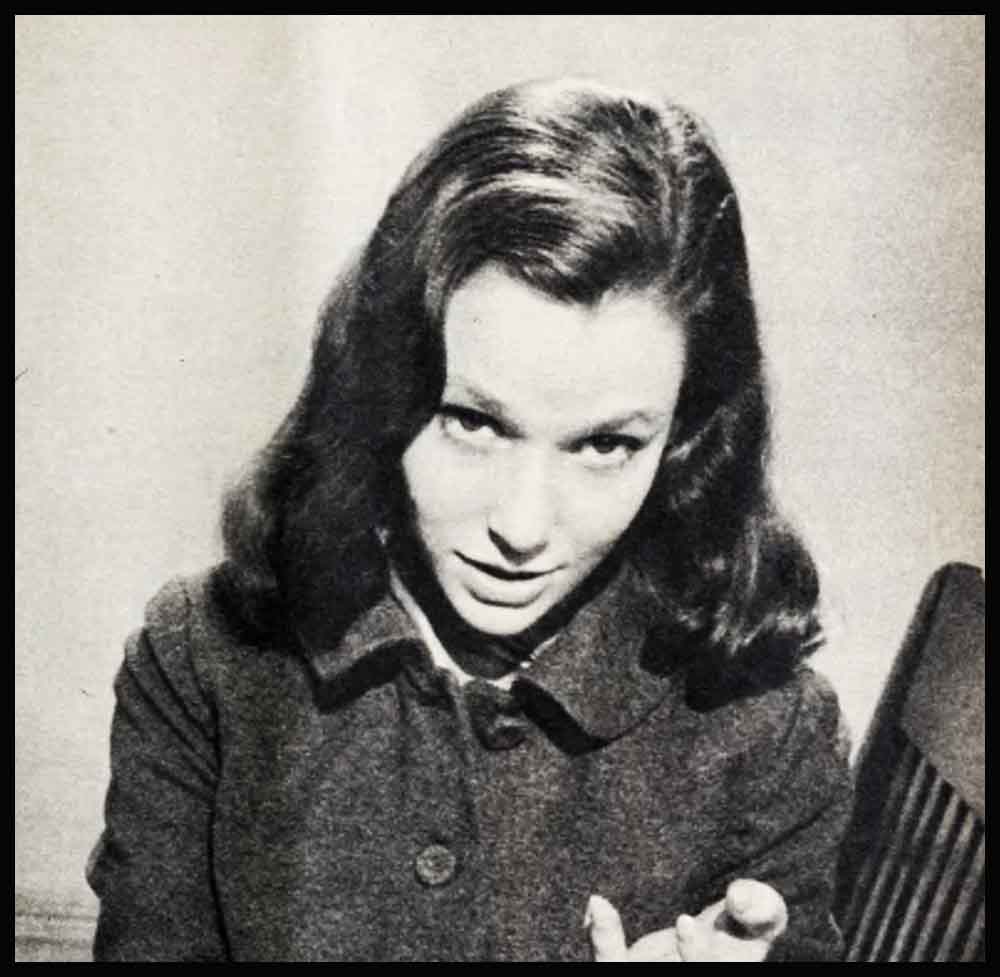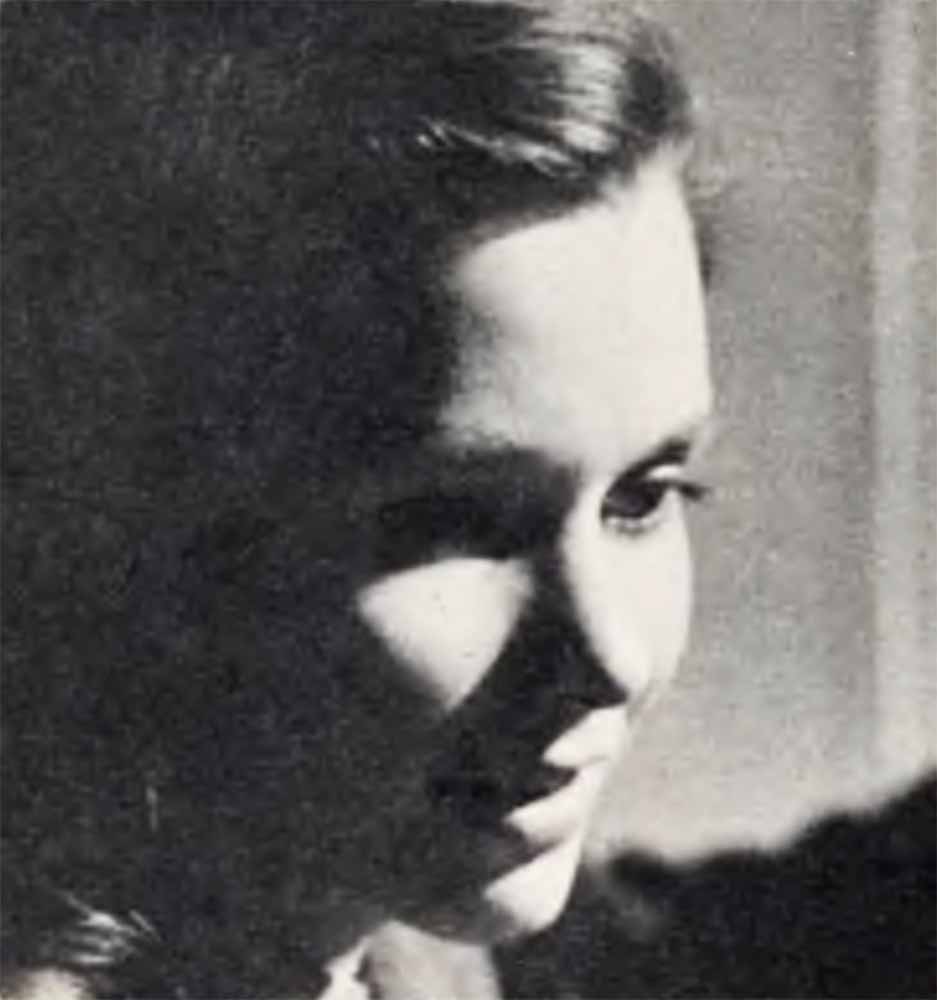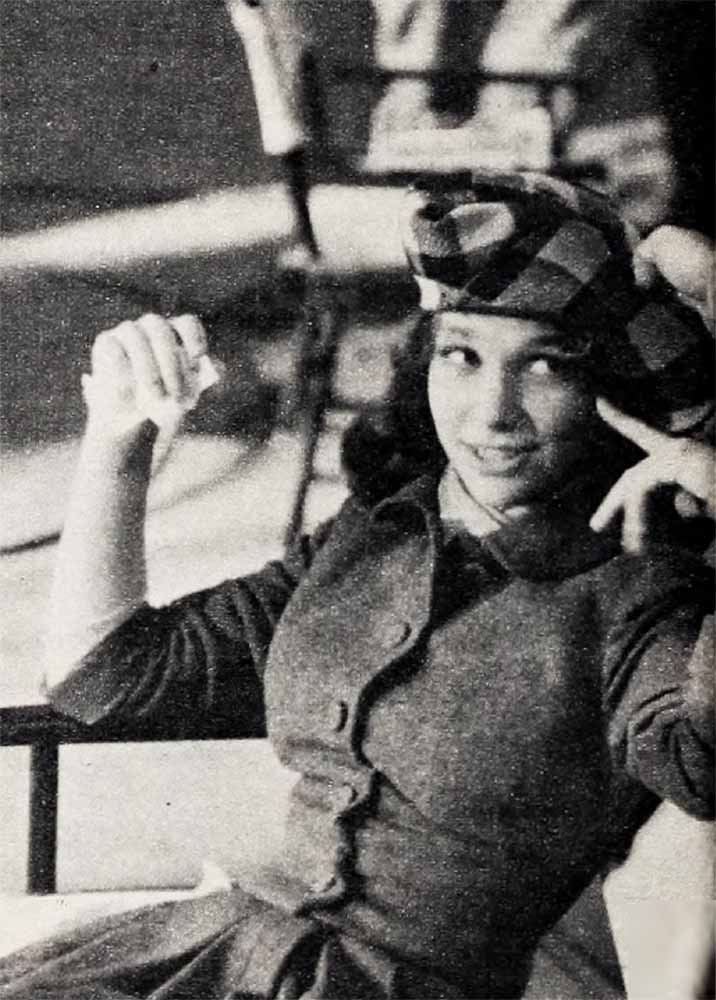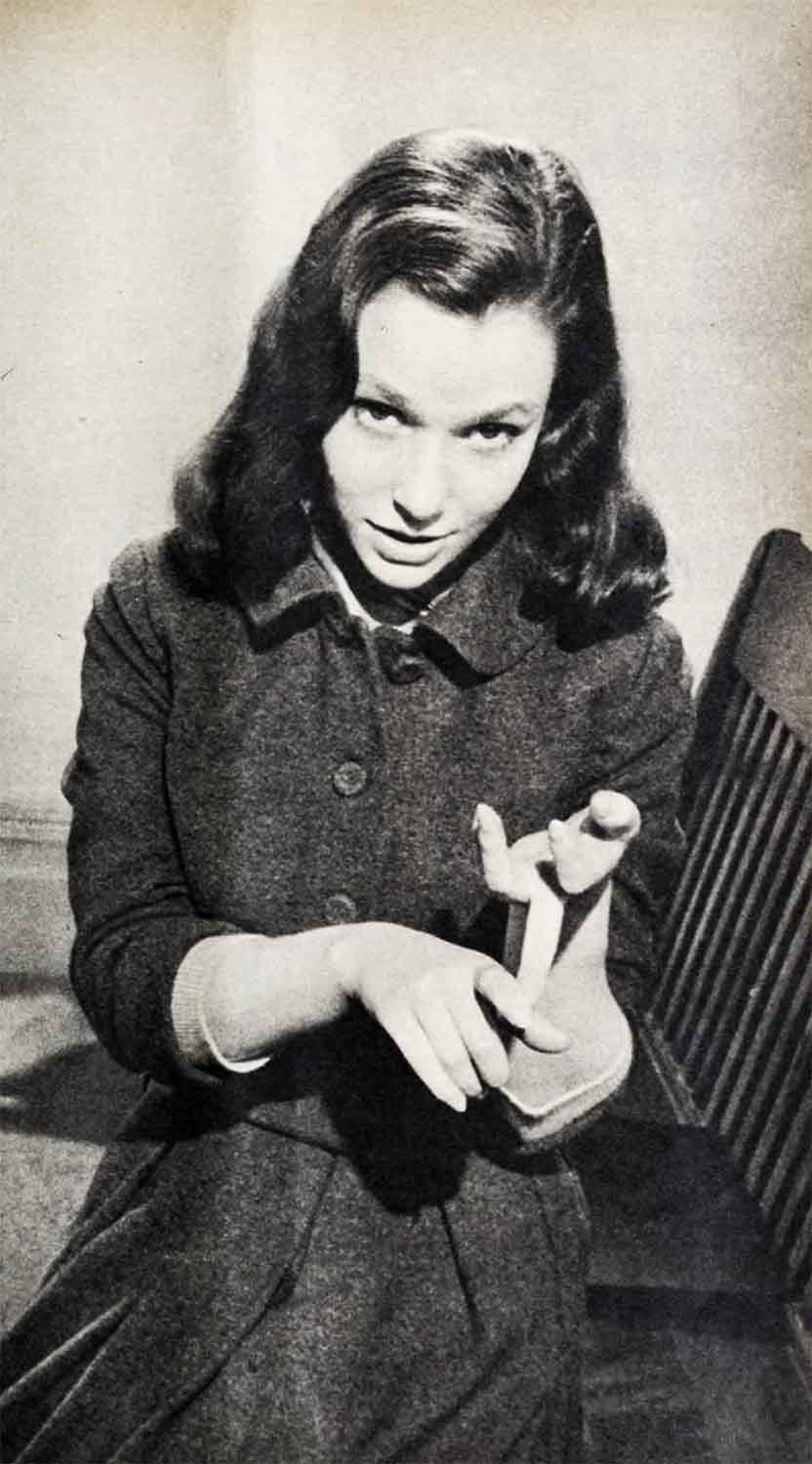
Wake Up, Little Susie
The girl was hunched down in a seat in the projection room. Her lips were drawn in a thin, tight line. Her brown eyes were frightened, and she was tugging nervously at a strand of her long, dark hair.
“Hey, Susie!” Henry Fonda called out. “You’ll love the picture. You were great!”
Susan Strasberg stopped pulling at her hair and forced a smile. “Sure. Great like Donald Duck!”
The lights went out in the projection room and the people who had assembled to watch the first studio preview of “Stage Struck” quickly settled themselves. Susan Strasberg sank back still further, looking tinier than ever. When the picture started, Susie shifted positions and curled up in a little knot. Each time one of her scenes came on, she squirmed, twisted her hair and seemed almost to try to crawl right into the upholstery.
When the preview was over and the lights were turned on, Fonda called to her. “Well, how’d you like yourself, Susie?”
Susie was dabbing her eyes with a handkerchief. “I didn’t,” she said in a choked şort of way. Then the tears gushed forth in earnest. “They cut some of my best scenes!” she cried.
Co-star of “Stage Struck,” Henry Fonda ambled over and sat beside her. “But that’s picture business,” he said consolingly.
“I guess so,” Susie nodded, mopping her eyes again. “But my voice! Did you hear my voice? You can accept the fact that you may look terrible. but you expect your voice, at least, to sound lovely.”
“You’re too conscientious,” Fonda smiled. “But you’ll get over it.”
That was last year, and Susie hasn’t gotten over it, yet. She’s one of the biggest worriers in the movie industry. And she knows it. “I’ve been that way all my life,” she says. (All her life means exactly 20 years.) “When I was little,” she goes on, “I used to worry about whether my dolls liked the names I’d given them—they were chosen from the Bible or Shakespeare. When I was thirteen, I had a terrible time trying to decide whether to become an artist or an actress. Today, I’m constantly worried about my performances.”
And yet, Susan Strasberg needn’t be such a worry wart. She now has her third film hit, “Stage Struck,” showing across the country, plus her second smash Broadway play, “Time Remembered,” selling to standing room only.
But somehow, Susie still isn’t convinced that talent and success are really hers to have and to keep. “There’s a line in ‘Time Remembered,’ ” she tells you, “which I’m always repeating to myself. It’s ‘Prick me with a pin to make sure I’m not dreaming.’ Well, that’s just the way I feel. Everything that’s happening seems unreal.”
To understand what Susie means you have to remember that she’s the daughter of famous theatrical parents. Her father is Lee Strasberg, director of the famed Actors Studio; and her mother, a former actress, coaches stars like Marilyn Monroe. Theater greats were constantly guests in the Strasberg home, and Susie’s ambition to act was kindled early. But she didn’t dare dream that she ever could perform on a par with her parents and their celebrated cronies. When Susie, at thirteen, finally announced she’d like to try the acting game herself, the Strasbergs threw up their hands in horror. “They didn’t want an actress in the family,” Susie recalls, “particularly a child prodigy.”

So it took nerve and plenty of it for tiny Miss Susan Strasberg to strike out on her own and prove her mettle by landing her first role in an off-Broadway play—and at the age most girls are entering high school. She followed up the stage role with television appearances, was satisfied with her moderate success and never once thought of becoming a movie actress.
Then when Susie was sixteen, she accompanied her mother out to California and happened to tag along the day Mrs. Strasberg had a luncheon with an M-G-M producer. In the middle of the meal, the producer took a long look at Susie and exclaimed, “Say, you’d be just right for the girl in ‘Cobweb’!” As a result, Susie’s sensitive performance in “Cobweb” won her wide acclaim and a bigger role in “Picnic.”
It happened almost the same miraculous way in the theater, too. Susie had auditioned, along with at least 100 other aspiring young actresses, for the name part in “The Diary of Anne Frank.” She didn’t hear a word from the producers for months afterwards and gloomily decided she wasn’t experienced enough for the role. Then, out of the blue, she suddenly was summoned to go into rehearsals. “Anne Frank” opened on Broadway October, 1955. Susan Strasberg was such a huge success that her name soon was put up in lights on the marquee beside the great Joseph Schildkraut.
However, “Stage Struck” had a different beginning. A year or so ago, Susie was asked if she’d like the part of the young actress in the picture, and she said yes. When she heard Henry Fonda and Herbert Marshall were going to be in the cast, she grew more excited, and when it was decided “Stage Struck” would be filmed entirely in New York, her home town, Susie was ecstatic.
“We started shooting right in the middle of winter with ice on the streets and snow flying all around,” she recalls. “Often we started to work at four or five in the morning. Times Square was deserted. It was beautiful! One scene was shot right on the same Street where ‘Time Remembered’ opened later. But,” adds Susie with a smile, “the stage struck girl in the picture is not me! The only thing we have in common is that we both love to act.”
No, the real Susan Strasberg is very different—in a dozen unexpected ways.
“Oh, I do a lot of terrible things!” Susie gaily admits. “Last summer, I decided to put a rinse on my hair so I’d look glamorous. The rinse worked out fine, but I started getting itchy bumps all over me. I went to the doctor and he said I had an allergy, and every day I had to cut out something from my diet. Still, I kept having the bumps. One morning, I washed out the rinse and the bumps went away!”

And then there was the case of the Dior hat Susie bought to wear in “Time Remembered.” It was an elegant thing, a mass of soft, white feathers. But the first night she wore it on stage, the feathers waved so much in the air, the director told her the hat was definitely out. “So I kept it for myself,” says Susie. “And when we were trying out the play in Washington, Helen Hayes invited me to accompany her to the White House to watch Queen Elizabeth’s arrival. I wanted desperately to wear my lovely hat, but it was raining. So I bought a white umbrella. I can still remember standing on the steps of the White House in the crowd, with my umbrella over the hat, wondering if the hat was going to go ‘sop’ like a souffle as the queen walked by.”
Susie declares she has always loved hats, but was embarrassed to wear them—“except to cover up pin curls.” However, when people complimented her on the Dior creation, she went right out and splurged on three more expensive bonnets. “Then,” she grins, “I was sorry I was so extravagant and I’ve begun a practice of wearing anything I’ve ever bought, whether I like it or not.”
But it wasn’t always that way. “I used to go on wild spending sprees, not even looking at the price tags,” she confesses. “But now I’m very good. I have my own bank account and charge accounts. And I keep precise records—or at least, records!” she adds with a smirk. “Today, there’s only one thing I do have to buy—shoes. My feet have grown a half-size. But that’s all of me that’s grown. I still wear a size five dress—taken in! Somebody should start making size threes for small girls like me.” (For the statistics, Susie is five foot one, weighs 95 pounds.)
“I don’t diet,” says Susie, “and my eating habits are dreadful! When we were with the play in Washington, I gained four pounds. I was in a hotel, and the very thought of being able to pick up the phone and order anything you wanted was entirely too tempting. I used to order four or five complete meals a day just so they’d bring them up on a tray, so elegant in all the silver dishes.”
Susie eats breakfast late—and we do mean late. Recently, a reporter made a date to interview the phenomenal Miss Strasberg at a restaurant at one p.m. “I think the man got sick,” Susie laughs. “It was breakfast time for me and I ate three pieces of toast with butter and marmalade and then I had tea and scrambled eggs and finished it all off with cherry pie and gobs of whipped cream. It was the pie, I suspect, that finished the reporter, too!”
Another time, Susie accompanied friends after the theater for a midnight snack. It was a swanky place and Susie ordered caviar and tea. Then halfway through the caviar, she shocked her companions by asking for a double portion of ice cream. “But I adore ice cream,” she explains. “Any flavor.”
There are, however, two sides to Susie—her girlish, impulsive side and her serious, objective side. “I think I’ve changed a lot in the last two years since I made ‘Picnic,’ ” she reflects soberly. “I’m more on my own now, although I’m still just as shy. I know I’ve always had a bad habit of saying the wrong thing at the wrong time, then talking fast to cover up. But that’s the old Susan Strasberg. Today, I see these faults; only I try to accept myself as I am. If I feel shy and really have nothing to say, I just say nothing at all. Covering up isn’t good. The best thing is to accept yourself as you really are.”
Like many timid girls, Susie constantly feels ill-at-ease when she walks into a large gathering. “When you meet people you don’t know,” she says, “they expect a certain behavior from you just because you look like you should act and talk a certain way. My advice to timid girls is: Be yourself! If everybody tried to be the life of the party, it’d be a monotonous crowd.”
Near-sightedness is another of Susie’s problems. “Often, when I’m not wearing my glasses,” she remarks, “I fail to recognize friends on the street and they think I’m snubbing them. I’m always getting into hot water that way! And then there’s the predicament about getting a driver’s license. I can drive a car, but I can’t get a license. I’ve tried twice, but I couldn’t pass the eye test—even with my glasses. Somehow, I get very nervous with eye tests. I’ve had a block about them since I was twelve. But I have stronger glasses now and I’m going back to try again. I think I’ll make it this time. You see, I want a car of my own in the worst way!”

Failure is one thing Susie simply can’t stand. When she didn’t receive her high-school diploma from Professional School in New York, she was distressed for months. Actually, it wasn’t her fault. Susie had become ill during that last semester and by the time she was well enough to go back to classes, she was busy with Hollywood and the theater. “I used to worry about it,” she admits. “In fact, I still do. I wonder if some day my children will say, ‘Well, you didn’t get a diploma, why should we?’ ”
But Susie is also a great one for rationalizing. “On the other hand,” she says, “it doesn’t always work out that way. I don’t think my father ever graduated from high school, and look at him—he’s taught in colleges! But then again, there’s my young brother, John, who’s studying to become a doctor. He really needs a diploma. Maybe I should have gotten one, too. It’s important for young people to follow through, to complete things, or they get a feeling of irresponsibility. My only excuse is that I’ve found life is an education. I’ve learned so much from books, museums, people. And besides, if I’d gone to college I would have studied drama. And where can you learn drama better than in making movies and acting on the stage?”
Her opening night on Broadway in “Time Remembered” was an unforgettable nightmare for Susie. Nervous over the big event, she consequently got herself locked in the bathroom five minutes before show time. While the stagehands were trying to pry open the door, the play’s star, Helen Hayes, kept asking, “Where’s Susie, where’s Susie?” Susie shouted back timidly: “Oh, I’ll be out in time to take the final curtain call!” Stagehands worked desperately at the door, grumbling that they didn’t think they could possibly get it open. Susie kept repeating, “Prick me with a pin to make sure I’m not dreaming!” But finally, the door obliged and Susie dashed breathlessly out on the stage, just in the nick of time.
“A funny thing happened to me that opening night,” she recalls. “All of my emotions were going, but I was like an automobile with bolts too tight. My voice and my face were tense. Nothing came out right. There was a party after the show, but I was so ashamed of my performance, I took two hours to get there.”
Says Helen Hayes, who adores her, “I do wish Susie weren’t quite so earnest so soon. As a mother, I’d like to urge her not to give up all the wonderful experiences that come only when you’re young.”
Miss Hayes remembers attending a performance of “Anne Frank” when Susie determinedly went on in spite of severe laryngitis and a 101 temperature. “I went backstage,” says the immortal Helen Hayes, “and saw Susie with a rosy, feverish face, hardly able to talk. I was so touched, I sent her a letter the next day, telling her, ‘Please, please don’t be so dedicated. The show does not always have to go on.’ ”
“Susie lives, breathes, eats the theater,” said her mother. “Even the walls of her living room are covered with photographs of great actors and actresses.” Susie now has her very own apartment, consisting of two rooms and a bathroom, within her parents’ spacious apartment on New York’s Central Park West. The living room is decorated daintily in period furniture. The bedroom has white, wall-to-wall carpeting. The bathroom sports a large purple rug and a surprising, ostentatious, crystal chandelier—a splurge, Susie admits.
And she has her own private telephone, which she shyly admits is used quite frequently to talk to her boyfriends. “I have a lot of dates,” she says. “I love going out. What girl twenty doesn’t? I have more variety now than I had a year or two ago. Variety in ages, I mean. When you’re eighteen, a man thirty seems too old. But when you’re twenty, it’s different. I don’t have any favorite places. I can go almost anywhere with good company and enjoy myself, or I can go some place I love with someone I don’t like so much and be miserable.”
Dancing is Susie’s favorite pastime and she confesses she really gets herself decked out for the occasions. Sometimes, she wears a long train on her dress and it gets stepped on. “But I don’t care,” she laughs. “I’m going to dance, anyway. Except the other night. I wanted to do the Charleston, but the floor was so crowded, there was no room to kick!”
Wolves? “I don’t try to handle them,” she contends, “I ignore them. Trying to handle people means trying not to hurt their feelings, and if they’re wolves you only get more involved. My method is just to expect every man to be a gentleman. Sounds like I really know! But honestly, I haven’t met that many wolves!”
Like any other young girl, thoughts of marriage have entered Susie’s mind. She’s already had a goodly share of proposals, but claims she thought more about a wedding ring when she was seventeen than she does now. “Some of my girlfriends are married and having babies already. It makes me feel so old!” she moans. “I guess I’ll get married eventually, but there’s no rush.”
In the meantime, Susie is trying to organize her busy life. Things are Corning fast and there’s so much to do. She had to fly out to Hollywood to make publicity pictures for “Stage Struck,” then hurry back east for the play. Now, at last, she has time to fulfill a long-cherished desire—to be a “watcher” at Actors Studio. She’d like to become a regular student, but explains one can’t be enrolled without passing an audition. “And I haven’t the nerve to take an audition!” Then there’s lots and lots of reading to catch up with. Particularly poetry. “I hunger for the words,” says Susie, “as I would for food.”
Summers, if possible, are spent at her parents’ cottage on Fire Island, where Susie wears big, floppy hats and dark glasses to protect her face from becoming freckled. She took up chess last summer, found it fascinating, but quit because it robbed her of precious time for reading.
Susie’s looking ahead, too. She’s very much aware of the fact that she has changed considerably since the movie public saw her last. “But if I didn’t change,” she contends, “people would say, ‘What’s Susan Strasberg trying to do—still look like a kid?’ ” Today, Susie says she’s no longer a teenager. She has her first fur coat, wears high heels and makeup and dresses like any other smart, young career woman. “I’ve been going through the adolescent-into-womanhood stage,” she remarks. “And I hope I’ve made it. There’s another movie I want to do soon. It’s a romantic part. I want to be ready for it.”
And after that? “More of everything!” says Susie. “I’m in love with the world at large, so anything that comes my way will be perfectly all right with me! I’m ready!” This little Susie is all woke up.
THE END
It is a quote. PHOTOPLAY MAGAZINE JULY 1958





No Comments